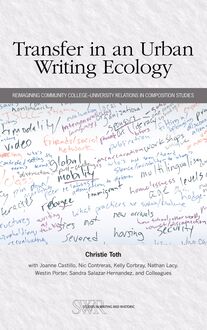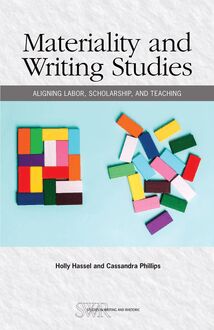-
 Univers
Univers
-
 Ebooks
Ebooks
-
 Livres audio
Livres audio
-
 Presse
Presse
-
 Podcasts
Podcasts
-
 BD
BD
-
 Documents
Documents
-
- Cours
- Révisions
- Ressources pédagogiques
- Sciences de l’éducation
- Manuels scolaires
- Langues
- Travaux de classe
- Annales de BEP
- Etudes supérieures
- Maternelle et primaire
- Fiches de lecture
- Orientation scolaire
- Méthodologie
- Corrigés de devoir
- Annales d’examens et concours
- Annales du bac
- Annales du brevet
- Rapports de stage
La lecture à portée de main
Vous pourrez modifier la taille du texte de cet ouvrage
Découvre YouScribe en t'inscrivant gratuitement
Je m'inscrisTransfer in an Urban Writing Ecology , livre ebook
Découvre YouScribe en t'inscrivant gratuitement
Je m'inscrisEn savoir plus
Vous pourrez modifier la taille du texte de cet ouvrage
En savoir plus

Description
Sujets
Informations
| Publié par | National Council of Teachers of English (NCTE) |
| Date de parution | 21 mars 2023 |
| Nombre de lectures | 0 |
| EAN13 | 9780814155196 |
| Langue | English |
Informations légales : prix de location à la page 0,2000€. Cette information est donnée uniquement à titre indicatif conformément à la législation en vigueur.
Extrait
CCCC STUDIES IN WRITING & RHETORIC Edited by Steve Parks, University of Virginia
The aim of the CCCC Studies in Writing & Rhetoric (SWR) Series is to influence how we think about language in action and especially how writing gets taught at the college level. The methods of studies vary from the critical to historical to linguistic to ethnographic, and their authors draw on work in various fields that inform composition—including rhetoric, communication, education, discourse analysis, psychology, cultural studies, and literature. Their focuses are similarly diverse— ranging from individual writers and teachers, to work on classrooms and communities and curricula, to analyses of the social, political, and material contexts of writing and its teaching.
SWR was one of the first scholarly book series to focus on the teaching of writing. It was established in 1980 by the Conference on College Composition and Communication (CCCC) in order to promote research in the emerging field of writing studies. As our field has grown, the research sponsored by SWR has continued to articulate the commitment of CCCC to supporting the work of writing teachers as reflective practitioners and intellectuals.
We are eager to identify influential work in writing and rhetoric as it emerges. We thus ask authors to send us project proposals that clearly situate their work in the field and show how they aim to redirect our ongoing conversations about writing and its teaching. Proposals should include an overview of the project, a brief annotated table of contents, and a sample chapter. They should not exceed 10,000 words.
To submit a proposal, please register as an author at www.editorialmanager.com/nctebp . Once registered, follow the steps to submit a proposal (be sure to choose SWR Book Proposal from the drop-down list of article submission types).
SWR Editorial Advisory Board
Steve Parks, SWR Editor, University of Virginia
Chanon Adsanatham, Thammasat University
Sweta Baniya, Virginia Tech
Kevin Browne, University of the West Indies
Shannon Gibney, Minneapolis Community and Technical College
Laura Gonzales, University of Texas-El Paso
Haivan Hoang, University of Massachusetts-Amherst
Stephanie Kerschbaum, University of Washington
Carmen Kynard, John Jay College of Criminal Justice
Staci M. Perryman-Clark, Western Michigan University
Eric Pritchard, University at Buffalo
Tiffany Rousculp, Salt Lake Community College
Khirsten Scott, University of Pittsburgh
Kate Vieira, University of Wisconsin–Madison
Bo Wang, California State University
Staff Editor: Cynthia Gomez
Manuscript Editor: Leigh Scarcliff
Series Editor: Steve Parks
Interior Design: Mary Rohrer
Cover Design: Pat Mayer
Cover Image: Christie Toth
ISBN 978-0-8141-5518-9 (paperback); ISBN 978-0-8141-5519-6 (ebook); 978-0-8141-0084-4 (PDF)
Copyright © 2023 by the Conference on College Composition and Communication of the National Council of Teachers of English.
All rights reserved. No part of this publication may be reproduced or transmitted in any form or by any means, electronic or mechanical, including photocopy, or any information storage and retrieval system, without permission from the copyright holder. Printed in the United States of America.
It is the policy of NCTE in its journals and other publications to provide a forum for the open discussion of ideas concerning the content and the teaching of English and the language arts. Publicity accorded to any particular point of view does not imply endorsement by the Executive Committee, the Board of Directors, or the membership at large, except in announcements of policy, where such endorsement is clearly specified.
NCTE provides equal employment opportunity (EEO) to all staff members and applicants for employment without regard to race, color, religion, sex, national origin, age, physical, mental or perceived handicap/disability, sexual orientation including gender identity or expression, ancestry, genetic information, marital status, military status, unfavorable discharge from military service, pregnancy, citizenship status, personal appearance, matriculation or political affiliation, or any other protected status under applicable federal, state, and local laws.
Every effort has been made to provide current URLs and email addresses, but because of the rapidly changing nature of the web, some sites and addresses may no longer be accessible.
Library of Congress Control Number: 2022950589
For the Salt Lake Community College transfer students who built the Writing Studies Scholars program, and for those who will create its future. You’re making composition studies a discipline worth being.
CONTENTS
Acknowledgments
Foreword
Tiffany Rousculp
Start Here: Reimagining Relations
Part I: Polygraph
Interstitial I: Nic’s Theory of Mentorship
Chapter 1: Composing Salt Lake’s Writing Ecology
Part II: Transfer-Conducive Disciplinary Ecologies
Interstitial II: Nate’s College Calculus
Chapter 2: A Discipline Worth Being
Interstitial III: Claudia’s Theory of Writing
Chapter 3: Toward Transfer-Conducive Writing Ecologies
Interstitial IV: Joanne’s TYCA-West Keynote
Chapter 4: Pathways and Ecologies
The End of the World as We Know It
Part III: Emergent Principles for Partnership
Notes
Works Cited
Index
Contributors
ACKNOWLEDGMENTS
THIS BOOK AND THE PROJECTS IT documents have been profoundly collaborative. Our work has relied on the contributions of dozens of faculty, staff, administrators, undergraduate and graduate students, and community supporters. We have sought to acknowledge those contributors by name throughout the text, always in relation to their specific involvement. Here, I would like to thank some of the otherwise unacknowledged people who have shaped my thinking over the years and made my contributions to these collaborations possible.
Thank you to my undergraduate institution, Bowdoin College, for providing support I have tried to pay forward in some very different educational spaces. I’m particularly grateful to Anne Henshaw and the Rusack Coastal Studies Fellowship, which provided a transformative undergraduate research experience that informed my collaborations with undergraduates at the University of Utah. Likewise, I’m grateful to professors Scott MacEachern, Liz Muther, Krista Van Vleet, Dan Levine, and Matt Klingle, all of whom were wonderful teachers and made me feel as if my writing mattered. Bowdoin College also provided me with several graduate scholarships that made it possible to attend conferences and conduct research that I would otherwise have been unable to afford.
Thank you to the mentors I found in my master’s program and subsequent staff position at Portland State University. Professors Hildy Miller and the late Duncan Carter and Hugo du Coudray introduced me to the field of composition studies, gave me my first graduate research experiences, and encouraged my interest in community college writing instruction. Dan DeWeese and Jonathan Walker also provided essential mentorship along the way. PSU faculty Carol Morgaine, Barbara Brower, Candace Reynolds, Hank Renfro, and Justin Fallon Dollard all mentored me as an apprentice teacher. Office of Institutional Research and Planning colleagues Rowanna Carpenter and Juliette Stoering offered both friendship and opportunities to research urban transfer networks.
Many thanks to my transdisciplinary community at the University of Michigan. I wasn’t an especially easy doctoral student to work with, which makes me all the more grateful to Anne Gere, Scott Lyons, David Gold, Vilma Mesa, Peter Bahr, Larry Rowley, Dick Alfred, and Ruth Behar, each of whom pushed me to do my best possible work and provided pieces of the puzzle that became this book. Anne Curzan and Jeanie Laubenthal also offered encouragement at key junctures during my time in the Joint Program in English and Education (JPEE). The School of Education, the Rackham Graduate School, and the Sweetland Center for Writing all provided me with financial support and professional development opportunities while I was at Michigan—special thanks to Sweetland colleagues Naomi Silver, Louis Cicciarelli, and Anna Knutson for working with me on transfer student writing initiatives. Thank you to the University of Michigan Graduate Employees’ Organization for fighting for the compensation and benefits that made my graduate experience possible.
I am grateful for the many brilliant and committed graduate student teacher-scholars who were such a profound part of my doctoral education. My JPEE Chalk and Cheese seniors were all essential mentors—special thanks to Mike Bunn, Anne Porter, Tim Green, Zac Lancaster, Moises Escudero, Randall Pinder, and of course Laura Aull. Thank you to my extended cohort, from whom I learned so much: Melody Pugh, Joanna Want, Crystal VanKooten, Danielle Lillge, Sarah Swofford, Justine Post, Liz Homan, Rebecca Manery, Will Hutchinson, Chinyere Uzogara, Lizzie Hutton, Gail Gibson, Ben Keating, Aubrey Schiavonne, and James Hammond. Special love to Merideth Garcia, who has been my teaching and writing bestie for the last decade.
Deepest thanks to my University of Michigan Community College Interdisciplinary Research Forum colleagues Brett Griffiths, Kate Thirolf, Chris Nellum, Johanna Massé, Rebecca Christensen, Inger Bergom, and Malisa Lee. This book is so indebted to the work we did together. Thanks also to the American Indian Studies Interdisciplinary Group, especially Frank Kelderman, Sophie Hunt, Michelle Cassidy, and Becky Hill—their influence might not be so obvious, but I promise it’s there. Finally, I am grateful to Ellen Cushman, Malea Powell, Andrea Riley-Mukavetz, Bump Halbritter, and Julie Lindquist, who generously extended their mentorship from East Lansing to Ann Arbor.
Over the years, dozens of community college faculty have been my mentors and collaborators. Portland Community College professor Maria Caruso and Cla
-
 Univers
Univers
-
 Ebooks
Ebooks
-
 Livres audio
Livres audio
-
 Presse
Presse
-
 Podcasts
Podcasts
-
 BD
BD
-
 Documents
Documents
-
Jeunesse
-
Littérature
-
Ressources professionnelles
-
Santé et bien-être
-
Savoirs
-
Education
-
Loisirs et hobbies
-
Art, musique et cinéma
-
Actualité et débat de société
-
Jeunesse
-
Littérature
-
Ressources professionnelles
-
Santé et bien-être
-
Savoirs
-
Education
-
Loisirs et hobbies
-
Art, musique et cinéma
-
Actualité et débat de société
-
Actualités
-
Lifestyle
-
Presse jeunesse
-
Presse professionnelle
-
Pratique
-
Presse sportive
-
Presse internationale
-
Culture & Médias
-
Action et Aventures
-
Science-fiction et Fantasy
-
Société
-
Jeunesse
-
Littérature
-
Ressources professionnelles
-
Santé et bien-être
-
Savoirs
-
Education
-
Loisirs et hobbies
-
Art, musique et cinéma
-
Actualité et débat de société
- Cours
- Révisions
- Ressources pédagogiques
- Sciences de l’éducation
- Manuels scolaires
- Langues
- Travaux de classe
- Annales de BEP
- Etudes supérieures
- Maternelle et primaire
- Fiches de lecture
- Orientation scolaire
- Méthodologie
- Corrigés de devoir
- Annales d’examens et concours
- Annales du bac
- Annales du brevet
- Rapports de stage







